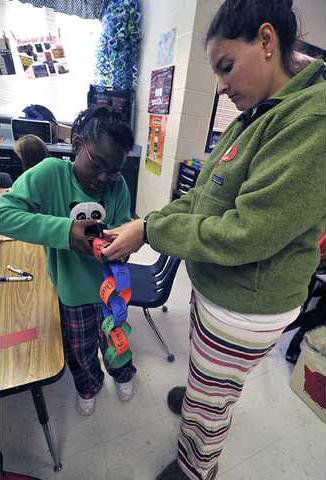Across Hall County and Gainesville schools, students are signing pledges to be drug-free as part of National Red Ribbon Week, an annual anti-drug campaign that began in 1988.
Spout Springs School of Enrichment students were visited by Shad Hall, Johnson High School resource officer, and his dog, Indy, who helps with drug investigations. Gainesville Middle School, which used student input to develop dress-up days and ideas, allowed students to pay $1 to dress up like nerds Tuesday, with all proceeds being donated to a local drug rehabilitation center.
Other dress-up days for schools included pajamas because "drugs make you lazy," camouflage for "joining the fight against drugs," crazy socks to "sock it to drugs," hats and backward clothes as part of the week's events.
"(Drug and alcohol use) is a serious issue," said Monica Hayman, seventh-grade counselor at Gainesville Middle School. "The age range is varying and it gets wider and wider every year."
Hall County and Gainesville students who begin using alcohol do so between ages 9 and 14, on average. The same goes for marijuana, prescription drugs and tobacco, according to data from the Georgia Student Health Survey.
The survey, which looked at more than 9,000 local students, showed most students statewide and locally understand the harm associated with drugs and alcohol. Still, drug use is a pervasive issue across the nation that school officials want to raise awareness of.
"I think there's a drug problem in every community in this country," Hall County Schools Superintendent Will Schofield said. "I think that's a challenge in this culture that permeates private and public schools and it's an issue we need to focus on."
Although a relatively small percent of local sixth graders use alcohol and drugs regularly — less than 1 percent — more than 25 percent of high school seniors use alcohol, and between 6 and 19 percent use marijuana, tobacco or prescription drugs at least once a month, according to the survey.
Prescription drugs are the most common abused drugs nowadays, with marijuana use down from previous years. That's comparable data to the state average, according to the survey.
Rakia Marcus, Gainesville Middle's eighth-grade counselor, said in the middle school, it's most important for students to be aware of the dangers if they do choose to use drugs or alcohol.
"Seventh- and eighth-graders have bigger social lives ... They need to have the ability to make that decision when they're put in that situation," she said.
West Hall Middle School students will hear from the Gainesville group 3 Dimensional Life Thursday and Friday. 3 Dimensional Life is a residential program for troubled teenage boys. The group will present teens who previously abused drugs or alcohol, said Natalie Soles, a counselor at the school.
"I feel like middle school is kind of our last chance to educate them and hope they see the dangers of drugs and alcohol," she said. "I honestly think it helps. In middle school, they don't do the theme days so much, but we still put it in their ear."
Both Gainesville City and Hall County schools partner with the Drug Free Coalition of Hall County during Red Ribbon Week. The coalition provides schools with stickers and pencils emblazoned with the 2011 theme, "It's up to me to be drug free."
Red Ribbon Week honors Enriqué Camarena, a U.S. Drug Enforcement Agency special agent assigned to the Guadalajara, Mexico, office in the mid-1980s, according to the DEA website.
Camarena was tracking some of the biggest marijuana and cocaine traffickers when he was kidnapped, tortured and murdered, an event that "opened the eyes of many Americans to the dangers of drugs and the international scope of the drug trade."
After Camarena's death, organizations sprung up in California that pledged to be drug-free in honor of the sacrifice he'd made. In 1988, those club pledges spread across America with the first national Red Ribbon Week. Students were encouraged to wear red as a sign of their commitment to abstain from drugs, the website said.
"It's just good to go ahead and talk as early as possible, especially with the upper grades," said Matt Maynor, principal at Enota Multiple Intelligences Academy. "I think it has a big effect. Schools, our community and our parents, we're all in this together. We talk about making good decisions in the future so it doesn't cause something bad for them ... If it sticks early, it's going to last longer."
Coalition intern Lauren Markovich, 22, a student at Gainesville State College, graduated from Gainesville High School. She remembers growing up with Red Ribbon Week.
"I remember feeling excited to go home and tell my parents how I was going to be drug-free," she said. "I feel like maybe in the lower grades it's more of an excitement of getting to do something new or getting a sticker ... In high school, that's when it really meant the most to me. It kept it fresh in my mind."
When it comes to drug education, Markovich believes there shouldn't be much sugarcoating.
"It's scary for me to see (the Georgia Meth Project) commercials. That's what we need to see. We really don't have any idea of the impact it has when you read it from a book," she said. "Kids need to be scared."

